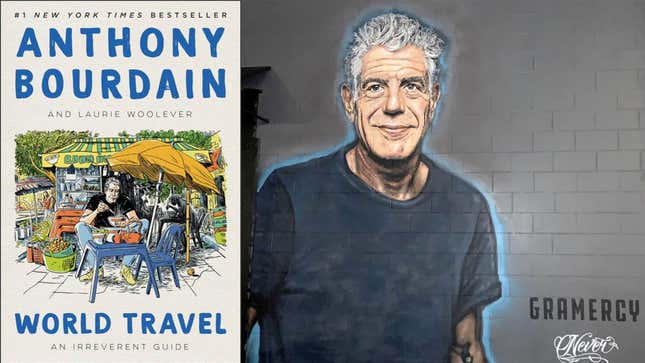
It was hard, I think, not to feel a personal connection with Anthony Bourdain. In his books, starting with Kitchen Confidential, he was candid about revealing his flaws and his struggles, and in his television shows, starting with No Reservations and continuing with The Layover and Parts Unknown, he was the sort of adventurous, curious traveler many of us dream of being. He didn’t just digest whatever the local tourism bureau threw at him; he really wanted to get to know a place and its people, but somehow, he was always himself. Before I sat down to write this, I watched the Jerusalem episode of Parts Unknown—an assignment even Bourdain admitted he was reluctant to take on—and was impressed by how fearless he was about asking the tough questions on both sides of the wall (or “fence”).
Now, three years after his suicide, his longtime assistant/“lieutenant” Laurie Woolever has published World Travel: An Irreverent Guide (Ecco), a Bourdain-esque alternative to Lonely Planet, Let’s Go, Frommer’s, etc. At least that’s what I think it was supposed to be: it’s much more opinionated and much more profane. Woolever and Bourdain met for exactly one brainstorming session before Bourdain’s death, a session that, fortunately, Woolever recorded and had transcribed. The original plan was to include guides to 43 different countries—how to get there, where to go, what to eat—supplemented by a dozen original essays by Bourdain.
What has been published is a collection of guides to 43 different countries—how to get there, where to go, what to eat—supplemented by relevant quotes pulled from episodes of Bourdain’s TV programs and essays by various Bourdain associates and guests. The best of these are written by Bourdain’s brother, Christopher, who reminisces about his and Tony’s early days eating in their native New Jersey and their first trip to Paris, and a behind-the-scenes look at the Uruguay episode of No Reservations, which was framed as Chris’ search for a mysterious great-great grandmother but was really about the brothers traveling and eating. (Chris did pay a 15-minute visit to the French embassy, but it was unfilmed.) There is also a touching essay by Nari Kye, a production manager who appeared on-camera during the South Korea episode of No Reservations, where she visited family and got in touch with her Korean roots. It changed her life: “Through my work, I’m developing creative content that’s centered on Korean culture,” she writes. “Everything I do is through that lens now. Tony was the person who unlocked that for me.”
The Tony who appears in World Travel, though, is a Tony in bits and pieces, and it’s mostly the Tony who talks in voiceover, not the Tony who listens and asks good questions and bullshits with his travel buddies. You also don’t get the visuals, both of the landscape and the food. (There are, however, line drawings by Wesley Allsbrook, including one particular endearing illustration for the India chapter of Bourdain riding a camel.) Sometimes Woolever will provide an aside about how the “story” of one particular episode was created, but since she wasn’t there, details are sketchy.
I suppose I should be pleased, homer that I am, that Chicago gets a lot of ink in this book, but frankly, lots of people have already come to Chicago and eaten our hot dogs and rhapsodized about how it’s the last real city. What happened to the parts unknown? The chapters on Mozambique and Oman, for example, two countries that barely figure as tourist destinations, begin with a lot of voiceover about their history and culture and how things are changing, but then peter off into descriptions of piri-piri chicken and shuwa, a sort of goat barbecue that is Oman’s classic special event dish, and then... nothing else. It’s frustrating. After all that buildup about how Omani cuisine is a mixture of tastes from all its former empire, I wanted more—a lot more—than a goat buried in the sand. With coals.
This is not to say that World Travel is not an enjoyable read, especially if you are the sort of person (as I am) who enjoys checking out travel guides from the library and reading them for fun. It somehow manages to convey the impression of offering a clear-eyed look at every destination while simultaneously making each sound like someplace you should definitely go if you have the chance. (Which is, I guess, what Bourdain did in every episode of his shows and what made him such a great travel guide.) It’s just that I don’t know who the book is for, and why it exists, except that it was the last thing Anthony Bourdain planned before he died, and we all love and miss him. There’s not enough information for an actual world traveler, and there’s not enough Tony for a real Bourdain lover. Instead of reading this 500-page book, you could also rewatch your favorite episodes of No Reservations or Parts Unknown and get the full experience of both Bourdain and the countries he’s visiting.
Fortunately, Woolever has simultaneously been working on another post-Bourdain project, Bourdain: The Definitive Oral Biography, based, she told Eater, on interviews with 100 people who knew him. From this description alone, it sounds like a meatier project, one that may ease the Bourdain-longing among his fans. It’s due out in the fall. Which gives us something to look forward to.